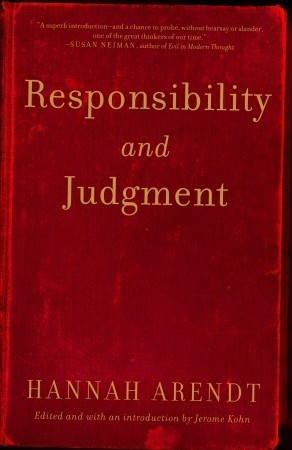What do you think?
Rate this book


295 pages, Paperback
First published November 18, 2003
"did not believe that analogies derived retrospectively from what had or had not worked in the past would avert the pitfalls of the present situation. As she saw it, the spontaneity of political action is yoked to the contingency of its specific conditions, which renders such analogies unavailing…Arendt did not mean that the past as such was irrelevant…but that the past is not past…the past—past action--can be experienced in the present…It is we as a people who are responsible for them now." (Kohn, Introduction, pp. vii-ix)It occurs to me that she might give the same response to climate activists who sought to apportion blame for the condition of the world and the direction of policy.
"There is such a thing as responsibility for things one has not done; one can be held liable for them…Two conditions have to be present for collective responsibility: I must be held responsible for something I have not done, and the reason for my responsibility must be my membership in a group (a collective) which no voluntary act of mine can dissolve, that is, a membership which is utterly unlike a business partnership which I can dissolve at will…This kind of responsibility is always political…[There is] a dividing line between political (collective) responsibility, on one side, and moral and/or legal (personal) guilt, on the other…In the center of moral considerations of human conduct stands the self; in the center of political considerations of conduct stands the world."Basically Arendt is making the point that no moral or personal attitude to things we have not done absolve us of responsibility for these things, and that we have a collective responsibility as human beings to deal with them…something we probably already knew in the case of climate change, except that now we all are both [politically] responsible for past errors and [morally] for errors made now. This essay was written in 1968.
"Thinking in its noncognitive, nonspecialized sense as a natural need of human life, the actualization of the difference given in consciousness, is not a prerogative of the few but an ever-present faculty of everybody; by the same token, inability to think is not the 'prerogative' of those many who lack brain power but the ever-present possibility for everybody—scientists, scholars, and other specialists in mental enterprises not excluded—to shun that intercourse with oneself whose possibility and importance Socrates first discovered (i.e., ‘the unexamined life is not worth living’). We were here not concerned with wickedness, with which religion and literature have tried to come to terms, but with evil; not with sin and the great villains who became the negative heroes in literature and usually acted out of envy and resentment, but with the nonwicked everybody who has no special motives and for this reason is capable of infinite evil…Please forgive my extended quotes which, out of context, may not make much sense. However, I am trying to carry you along with my thinking about the looming climate crisis, of which the approval of the Keystone XL Pipeline from the tar sands of Canada to the Gulf of Mexico seems the most egregious folly. One simply has to finally take a stand, and this is mine. It seems the scientific “logic” that goes along with approvals of this sort is what got us here in the first place. Perhaps a more wholistic view is in order at this time.
For the thinking ego and its experience, conscience, which ‘fills a man full of obstacles,’ is a side effect. And it remains a marginal affair for society at large except in emergencies. For thinking as such does society little good, much less than the thirst for knowledge in which it is used as an instrument for other purposes. It does not create values, it will not find out, once and for all what ‘the good’ is, and it does not confirm but rather dissolves accepted rules of conduct. Its political and moral significance comes out only in those rare moments in history when ‘Things fall apart; the centre cannot hold;/ Mere anarchy is loosed upon the world,” when 'The best lack all conviction, while the worst/ Are full of passionate intensity.’
At these moments, thinking ceases to be a marginal affair in political matters. When everybody is swept away unthinkingly by what everybody else does and believes, those who think are drawn out of hiding because their refusal to join is conspicuous and thereby becomes a kind of action.”